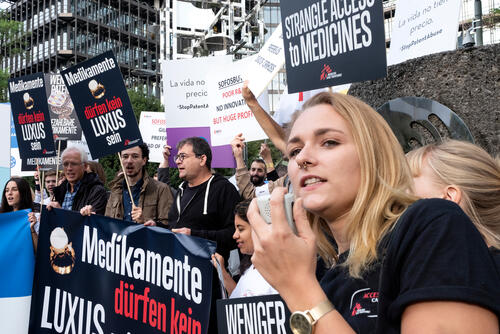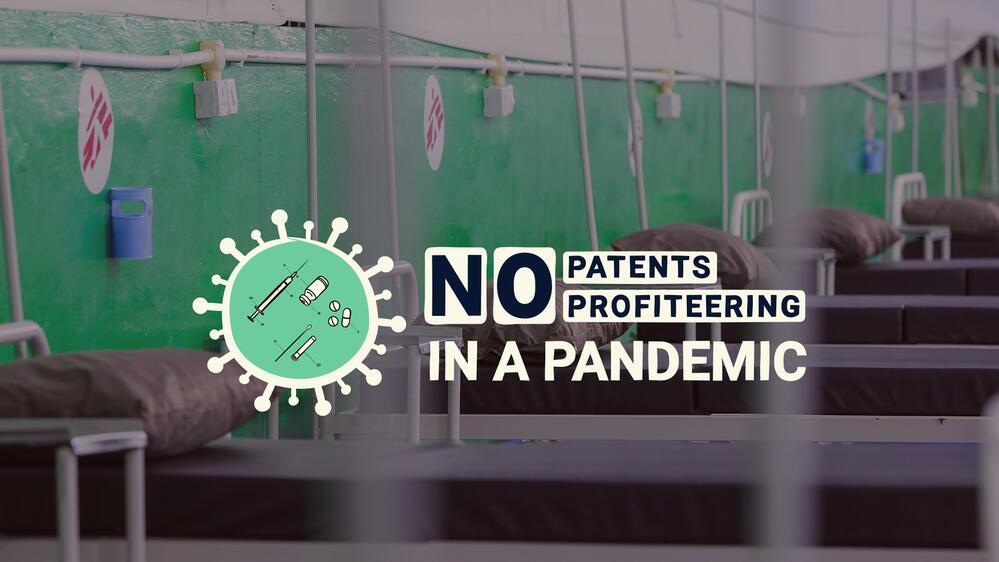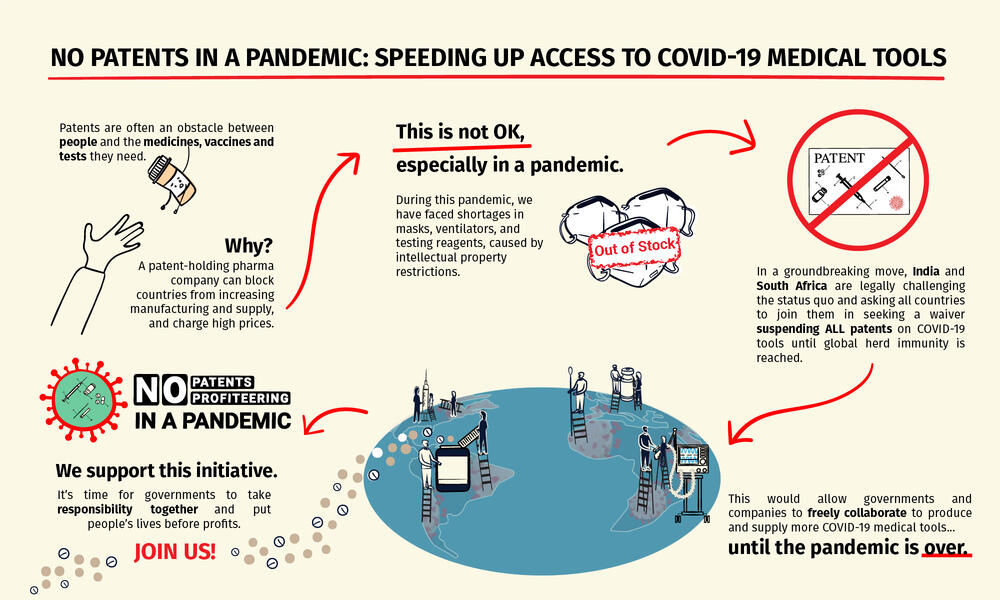MSF calls on all governments to suspend monopolies during COVID-19
MSF is calling on all governments to support a game-changing proposal that would suspend monopolies on vital medications and technologies during the COVID-19 pandemic.
This proposal would waive certain intellectual property rights and is already backed by 99 countries. However, multiple wealthy nations including the UK are yet to step up.
A landmark moment
The landmark request was put forward by India and South Africa in October and will be discussed at informal World Trade Organization (WTO) talks on 20 November.
The intellectual property waiver would allow all countries to choose to neither grant nor enforce patents for COVID-19 drugs, vaccines, diagnostics and other technologies for the duration of the pandemic until global herd immunity is achieved.
“Governments need to ask themselves which side of history they want to be on when the books on this pandemic are written"
This move harks back 20 years to the HIV/AIDS epidemic when affordable generic HIV drugs were made in countries where patents did not block production, allowing millions of people's lives to be saved.
“Not even a global pandemic can stop pharmaceutical corporations from following their business-as-usual approach," said Dr Sidney Wong, executive co-director of MSF’s Access Campaign.
"So, countries need to use every tool available to make sure that COVID-19 medical products are accessible and affordable for everyone who needs them.
“All COVID-19 health tools and technologies should be true global public goods, free from the barriers that patents and other intellectual property impose. We’re calling on all governments to urgently throw their support behind this groundbreaking proposal that puts human lives over corporate profits at this critical moment for global health.”
Business as usual for Big Pharma
Since the start of the pandemic, pharmaceutical corporations have maintained their standard practice of rigid control over intellectual property rights, while pursuing secretive and monopolistic commercial deals that exclude many developing countries from benefitting.
For example, Gilead entered into restrictive bilateral licensing for one of the only drugs to have shown potential benefit to treat COVID-19, remdesivir, excluding nearly half of the world’s population from benefitting from price-lowering generic competition.
Several new and repurposed medicines and promising treatments for COVID-19 are already patented in many low and middle-income countries such as Brazil, South Africa, India, Indonesia, China and Malaysia.
With the exception of one company, none of the COVID-19 vaccine developers have committed to treating intellectual property any differently than the status quo.
Some corporations have taken steps – through licensing and technology transfer deals – to use existing global manufacturing capacity to try and mitigate anticipated supply shortages of potentially successful vaccines. However, this has been the exception, and the licensing deals often come with clear limitations.

MSF's Access Campaign
One third of the world does not have access to essential medicines.
A chance to avoid tragedy
Historically, steps have been taken to overcome monopolies that have allowed pharmaceutical corporations to keep prices artificially high.
In 2001, at the height of the HIV/AIDS epidemic, the Doha Declaration affirmed governments’ rights to take all necessary measures to eliminate patents and other barriers, putting governments in the driver’s seat so they can prioritise public health over corporate interests.
This current waiver request to the WTO is a similar step to speed up the response to COVID-19.
"The UK has already pre-ordered enough potential future COVID-19 vaccines for more than five doses per person, but poorer countries are struggling to secure any doses at all"
“This bold step by governments offers the world a chance to avoid repeating the tragedy of the HIV/AIDS epidemic 20 years ago," said Dr Khosi Mavuso, medical representative for MSF in South Africa.
"[At that time] monopolies on lifesaving treatments saw people in high-income countries get access to HIV medicines while millions in developing countries were left to die.
“Overriding monopolies on COVID-19 medical tools will allow global collaboration to scale-up manufacturing, supply and access for everyone. With more than 1.3 million lives already lost to COVID-19, governments cannot afford to waste any more time waiting for voluntary moves by the pharmaceutical industry.”
Total hypocrisy from wealthy countries
At the last WTO meeting of the TRIPS Council (Trade-related Aspects of Intellectual Property Rights) on 15 and 16 October, Kenya and Eswatini joined India and South Africa in officially co-sponsoring the waiver.
A total of 99 countries have welcomed and shown support overall, but the waiver proposal is not being supported by multiple wealthy nations, including the US, the UK, Japan, Canada, Brazil, Australia, Norway, Switzerland and the European Union.
“Governments need to ask themselves which side of history they want to be on when the books on this pandemic are written,” said Wong.
“We’re calling on the UK government to see sense and support this proposal,” said Roz Scourse, policy advisor with MSF’s Access campaign.
“It’s a huge opportunity to secure affordable and equitable access to lifesaving COVID-19 medical tools for all, including people in low and middle-income countries – something the UK claims to support.
“We can already see massive inequities in the global response to COVID-19 that this waiver could help address. Vaccines are a good example: intellectual property barriers mean supplies are artificially limited.
"The UK has already pre-ordered enough potential future COVID-19 vaccines for more than five doses per person, but poorer countries are struggling to secure any doses at all. For the UK to hoard limited global supplies in this way and then refuse to back measures that would increase access across the board – it’s total hypocrisy.”
MSF and access to medicines
One third of the world does not have access to essential medicines.
In the poorest parts of Africa and Asia, this figure rises to half the population. We challenge the high cost of medicines and the absence of treatment for many of the diseases affecting our patients.
Too often we cannot treat patients because the medicines are too expensive, or they are no longer produced. Sometimes, the only drugs we have are highly toxic or ineffective and nobody is looking for a better cure.
As a medical humanitarian organisation, it is fundamentally unacceptable that access to essential medicines is increasingly difficult, particularly for the most common global infectious diseases.

